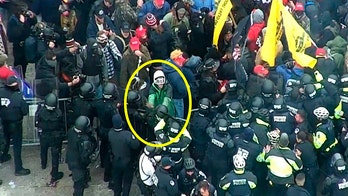As President Obama faces criticism from the left for his administration's campaign of deadly drone strikes overseas, the rising threat of terrorism in North Africa has some suggesting the U.S. open a new front in the drone campaign.
Obama promised in his second inaugural address to uphold the rule of law, emphasizing that America's longest war, in Afghanistan, was coming to an end.
"We, the people, still believe that enduring security and lasting peace do not require perpetual war," Obama said Monday.
But critics, including the American Civil Liberties Union, say the president's public promises conflict with his administration's private crafting of a manual that attempts to set clear standards for the use of drones in targeted killing missions.
“Here you have a secret playbook, a secret set of rules on how the president himself is going to make decisions on who to kill and who lives and who dies, including United States citizens,” Christopher Anders, senior legislative counsel with the ACLU, told Fox News. “And then you have a complete exception to the CIA use of drones in Pakistan. So how is that not endless war and how is that compliance with the rule of law?”
White House Press Secretary Jay Carney was pressed on the issue Tuesday in his daily briefing with reporters.
“We need to do everything we can to keep Americans and America safe, as well as our allies,” Carney said. “And we need to do it in ways that are consistent with our values and our laws, and that is certainly the approach that (Obama) has taken and will continue to take.”
But on Capitol Hill, lawmakers complain the administration is not being transparent about its efforts to draft a drone policy.
“We've been briefed on the use of drones. We've been briefed when the drones have been used. But there's no real strategy there. There's no guidelines there,” Republican Rep. Michael McCaul of Texas, the new chairman of the House Homeland Security Committee, told Fox News.
McCaul also said the briefings he has received combined with new images from the SITE Intelligence Group, which monitors jihadists messages on the Web, suggest Al Qaeda in North Africa is in possession of weapons from Libya, upping the ante in the region.
U.S. intelligence officials say they are still working to verify that Libyan weapons were used in the recent hostage crisis in Algeria. Neighboring Mali also is dealing with an Al Qaeda threat, which has prompted France to send in military reinforcements.
The United States, so far, has remained mostly on the sidelines of those conflicts, but McCaul said he expected the administration to consider expanding the drone campaign and other efforts to the region.
"I do think as we wind down in Afghanistan and Pakistan that some of this technology, special forces ... some of the drones, should be redirected to this Northern Africa front," McCaul said.
Ben Jensen, an assistant professor at the Marine Corps' Command and Staff College and American University, reviewed the images from SITE of trucks carrying what appeared to be ground-to-ground missiles.
“What you have is a proliferation and a flow of cheap weapons. That is the recipe for trouble for years and years to come. Cheap weapons, weak institutions and grievances," Jensen said. "And the problem for the U.S. is, while drones might give you easy options in the near term, it does nothing to solve any of those long-term problems.”
Neither the CIA nor a spokesman for the National Security Council responded immediately to a request for comment on the administration's counterterrorism manual and on the CIA campaign in Pakistan, where most of the drones are used.
“A very basic concept of the rule of law is that people know what the rules are, and having a secret playbook means you're not complying with the rule of law,” the ACLU's Anders said. “There's not a rule of law if people don't even know what the rules are.”




